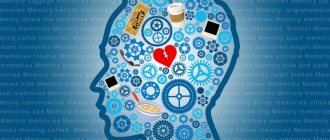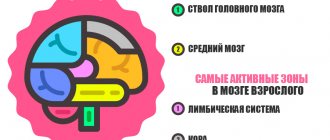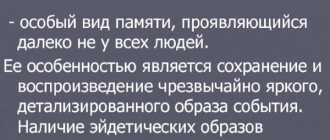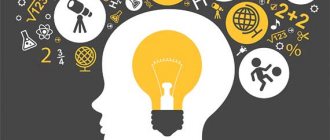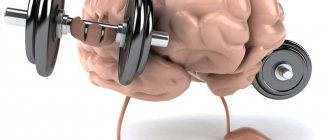We need memory throughout our lives. Just imagine, your memory has disappeared, you don’t remember anything. You wake up one fine day and realize that you don’t remember what your first name is, what your last name is, where you live, where you work, and so on. You don't remember anything. You can’t get to this point; develop memory and attention every day.
- 5 reasons for bad memory
- Exercises to develop memory and attention
- What to do if a child has a bad memory?
- Exercises for children
- Games for developing and training memory
- Super memory in 30 days
What can affect memory loss? What are the causes of memory loss?
- Wrong lifestyle. People who smoke and drink alcohol often suffer from memory loss.
- Poor nutrition and lack of oxygen. For good brain function you need a balanced diet, vitamins and microelements.
- Anxiety, lack of sleep, changes in biological rhythm, physical and mental stress - all this can cause forgetfulness and absent-mindedness.
- You are not interested and you do not know how to use your ability to remember. If you weren't taught it as a child, do it now.
Causes of short-term memory loss
Short-term amnesia develops for many reasons.
- Violation of the psycho-emotional background: stress, depression, negative influence of people. Often children do not remember memories from the past, since they became a psycho-emotional shock for them.
- Mechanical damage, trauma, poisoning, acute and chronic diseases, violations of the integrity of the cranium, central nervous system.
- Metabolic disease. The cause of the disease is poor nutrition, hormonal imbalance, congenital and acquired diseases.
- Increased fatigue. It occurs due to long hours of work, lack of normal sleep, physical and mental stress.
- Bad habits: alcoholism, drug addiction, smoking. Chemical compounds spread throughout the blood, organs and tissues, causing disturbances at the cellular level. If they affect the central nervous system, neurons gradually die, which leads to a decrease in the recording of short-term information.
- Neurodegenerative diseases. These include congenital or acquired disorders of the central and peripheral nervous system that reduce brain activity.
- Hormonal dysfunction. For example, women experience a loss of information during menopause.
- Dissociative fugue. This is the effect of severe stress, due to which the brain tries to get rid of memories. More often develops in childhood.
- Natural aging processes. In older people, neurons are destroyed, the functionality of the central nervous system and the transmission of nerve impulses decrease, so short-term recording of information decreases.
- The nutritional factor is a manifestation of insufficient intake of food into the body containing vitamins, minerals, trace elements, amino acids necessary for the normal functioning of the nervous system.
Interesting: Registration of disability after a stroke, procedure, groups
Each cause is treated separately by different doctors. To eliminate the cause of memory loss, the underlying factor is identified, and the risk of relapse is reduced.
Bad memory what to do?
A person is by nature very smart and developed, and in order for him to remain this way throughout his life, he must develop himself every day and lead a healthy lifestyle.
You can develop your memory and attentiveness at any time, even if you have no time.
From birth to old age, develop your memory. Some people think that if they retire, then they don’t need to engage in self-development. No, you must always practice. Children spend three months on vacation and also think that they don’t have to study. We need to study even in the summer, develop ourselves, read books.
Very often, pensioners forget everything on the go, they put the kettle on to boil and forgot, they went to the store and forgot what they needed to buy, they put the jacket down and don’t remember where.
Many people are given a good memory from birth, and some need to try to develop it.
If you train your memory and attention every day, you can achieve good results.
What is short-term memory?
The brain remembers everything experienced in life. Information is recorded from childhood, but a person remembers it with difficulty.
With short-term memory loss syndrome, the brain loses some of the events that happened a few minutes ago, but they are later remembered. He can independently remember moments from the past or with the help of a specialist (psychologist, psychiatrist, neurologist).
The condition is characterized by the loss of some information; the patient does not orient himself in space and does not remember the sequence of actions. He does not remember a period of time, the presence of certain people, certain circumstances from his life.
Partial amnesia most often develops in older people, but can also occur in young people when exposed to negative environmental factors.
Got a bad memory? What to do with bad memory?
5 reasons for bad memory
- Try to focus on one thing at a time. If you are sitting at a meeting, do not be distracted from the person who is leading the meeting, do not talk to your neighbor or correspond on the phone, do not be distracted by trifles. In the evening, try to remember and recall the entire meeting down to the smallest detail.
- Proper nutrition is very important for brain function. Try to avoid snacking on the go and don’t eat fast food - this is harmful to brain function. Include the following foods in your proper diet: vegetables, fruits, honey, dried fruits, nuts, herbs, grains.
- Don't overexert your brain. If you feel tired, there is no need to overexert yourself, give your body a chance to rest. A tired person perceives information poorly or does not perceive it at all.
- Load your brain only with useful information; try to discard unnecessary and unnecessary information, it only clogs your brain.
- Don't forget about walks in the fresh air. Active walks in the fresh air, preferably outside the city in nature, are necessary for the proper functioning of the brain; these can be various sports or just active recreation.
Exercises to develop memory and attention
Exercise 1
You need to go to the store and buy a certain list of products. You write your list on paper and go to the store with it so you don’t forget anything.
Try writing a list of products on paper and remembering it. In the store, buy items from memory. If the list is large and you are afraid of forgetting something, you can take this list with you, but do not use it, put it in your bag and try to buy it from memory.
Exercise 2
You met an old friend by chance on the street or in a store. You started a conversation. In this conversation, try to study this person in detail and remember: what color and shape of the eyes, what kind of face this person has, what clothes he is wearing, what he has in his hands, remember as much as possible. Try to remember your conversation verbatim. In the evening, try to remember your meeting and what you remember about this person, what you talked about, remember everything down to the smallest detail.
Exercise 3
Try to teach yourself to read. Choose an interesting book and start reading from one or two pages - not much - and try to reach thirty pages a day.
If you work and are busy all day, you can find time to read during your lunch break or in the evening before bed. After reading, try to retell what you read. You can also find time for this, for example, when you go to the store, to a school meeting, on the way home or on the way to work.
Exercise 4
On your way to work, you can memorize house numbers, and when you return from work in the evening, you recite these house numbers from memory.
You can simply walk down the street, no matter where you go, remember the license plates of the cars that pass by. In the evening, try to remember and tell these car numbers.
Exercise 5
This is a very simple exercise. When you go to the store, remember the prices of the goods you buy. You can compare these prices with prices from other stores.
Exercise 6
You are preparing a cake according to a new recipe. Try to remember it and prepare the cake from memory. Don't look at the recipe, try to memorize it.
Exercise 7
If you take the same route to the store or to work, change it, take different routes as often as possible and remember something new.
You can see a beautiful tree, a beautiful fountain, an extraordinary building, beautiful building facades and so on. After a while, remember your new route and walk along it mentally, remembering everything down to the smallest detail.
Exercise 8
Learn poetry every day. You need to study carefully without confusing words. Start with a quatrain, then gradually add volume and complexity to the verse. Recite poetry everywhere: on the way to work, on the way to the store, on the way to the boss’s office, and so on.
You can learn a new song in the same way. You can hum it everywhere: in the kitchen, in the bathroom, while you are cleaning, it turns out more fun and faster.
Exercise 9
Now let's look at more difficult exercises. Look at the picture, the words are written here: yellow (in blue), black (in green). You need to remember the first two lines, close the picture and write the words from memory with colored pencils or pens.
Check what you got. Now read and remember the second two lines, close the picture and write from memory. Then read and remember the third two lines, close and write from memory. Now memorize all six lines, close the words and write them from memory. Check what you got. Repeat the exercise.
Exercise 10
In this exercise, numbers are given, they are written in two different colors, black and red. Look carefully at these numbers and remember them. You have one minute to memorize. Cover the numbers and write from memory everything you remember in two colors, black and red.
Check what you wrote, if there are a lot of mistakes, try to memorize the first two lines first and then write them, then memorize the second two lines and write them from memory.
If everything is correct, you can practice and write all four lines.
Now try to learn the other way around, first the bottom line, then the second line from the bottom, and so on, and write them from memory. This exercise is a good memory training.
Exercise 11
Look carefully and remember the following picture, this picture shows animals, mammals, and fish. You have one minute to memorize.
Now cover the picture and write on paper from memory all the animals, mammals and fish in alphabetical order.
Write in which direction the animals are looking.
If you don’t remember all the animals or in the wrong order, repeat the exercise.
Exercise 12
Look at the following pyramid, it consists of numbers, one digit is added to each subsequent line. Remember the first three lines first, close the pyramid and write the numbers from memory.
Test yourself.
Now memorize one more line and write four lines from memory. Each next time, add one line and remember.
Remember and write all the numbers of the pyramid in full.
Exercise 13
Look at the following picture, it is divided into two parts, at the top of the picture there are circles, but at the bottom of the picture there are none. Remember in which cells the circles are drawn, close the first picture and draw circles in the second part of the picture from memory. You have one minute to memorize.
Check what you got. Repeat the exercise.
Exercise 14
In this exercise there are three columns with different words, read and remember them. You have one minute to memorize. Cover the words and write them on paper from memory in what order.
Look what you got. If you wrote it wrong, look again carefully and repeat the exercise.
Then look at the words again and cover them. Write all the words in alphabetical order. Repeat the exercise.
Memory losses
Encephalitis
Diabetes
14582 21 August
IMPORTANT!
The information in this section cannot be used for self-diagnosis and self-treatment.
In case of pain or other exacerbation of the disease, diagnostic tests should be prescribed only by the attending physician. To make a diagnosis and properly prescribe treatment, you should contact your doctor. “Memory lapses” mean complete or partial loss of memories.
However, such an interpretation may imply memory loss, or may indicate an inability to remember this or that fact at a given moment.
Varieties
Memory is ensured by the functional activity of all parts of the brain and includes various processes - memorization, storage (or, conversely, forgetting), recognition and reproduction. Disruption of any of these processes will lead to memory defects.
It is the fight against forgetting (an important process that protects the brain from excess information) that ensures the retention of important data.
Two more processes – recognition and reproduction – make it possible to “bring to the surface” the required information.
Thus, memory loss, or lapses, refers to the inability to recognize or reproduce data stored in the brain. Memory lapses (or amnesia) may occur over time. Retrograde
amnesia is characterized by the inability to remember events preceding an injury or illness;
anterograde amnesia
is accompanied by loss of memory for events that occurred after the illness.
There are also retroanterograde
amnesia (a combination of the first two) and
fixation
, characterized by the inability to remember current events.
If memory for events at the time of injury or illness is lost, they speak of congrade
amnesia.
Possible reasons
Memory lapses do not always indicate any disease.
Rapidly changing information is absorbed only by short-term memory and is stored for several days. An example of such memorization is preparation for an exam: a large amount of data is absorbed in a short time and just as quickly disappears from memory.
Storing information for long periods of time requires processing and encoding.
Only after this the necessary data is recorded in the brain structures.
In the presence of psychological factors
(stress, nervous overstrain) or constant fatigue and lack of sleep, concentration is disrupted, which impairs the memorization process.
Memory lapses often occur as a defensive reaction to emotional stress.
A typical example of this condition is sudden memory loss during exams or when speaking in front of an audience. These failures refer to transient memory impairments, but in some cases they may indicate a circulatory disorder in the area of the posterior cerebral arteries, which most often occurs with alcoholism and drug addiction
.
Damage to even small areas of the brain due to traumatic brain injury
also leads to memory loss or blackouts.
In this case, retrograde amnesia occurs, which lasts several hours before the injury. Longer fixation amnesia is also possible - several days immediately after the injury, which is noted when the patient is clearly conscious. A few days after the injury, memory is restored in most cases. Surgeries on the temporal lobes of the brain
lead to transient memory impairment .
Patients with epilepsy
forget not only the seizure itself, but also the short period of confusion after it.
In some cases, it is precisely such memory lapses that give reason to suspect epilepsy during non-convulsive seizures.
Memory disorders may be caused by metabolic disorders in the central nervous system.
Deterioration of brain function occurs with a lack of oxygen due to cardiopulmonary failure
, toxic damage due to
liver and kidney failure
.
Oxygen starvation of the brain after a sharp rise or fall in blood pressure is often accompanied by a sharp deterioration in memory.
The same effect has a decrease in glucose levels during fasting and
diabetes
. In addition, with diabetes mellitus, angiopathy develops - damage to blood vessels, which aggravates nutritional deficiency.
A sharp deterioration in memory with failures occurs with hypothyroidism
, which is caused by a lack of iodine in the body.
Deficiency of vitamin B12 and folic acid
is also accompanied by memory impairment.
Vitamin B12 is necessary for the regeneration of myelin, a substance that covers nerve fibers and ensures their functioning.
Destruction of the myelin layer is accompanied by slowing of nerve impulses and memory impairment. Memory may be affected in patients taking certain medications
. These include anticholinergics (atropine, scopolamine, platiphylline, metallisir), antidepressants and antipsychotics. Steroid hormones have a destructive effect on brain structures and, accordingly, memory. Recent studies show that people who take steroid hormones for a long time (for example, bodybuilders) have serious problems with visuospatial memory. Information about the negative effect of steroid hormones on memory should also be taken into account in patients with bronchial asthma and arthritis.
Tumors
, infectious diseases that lead to damage to the central nervous system sometimes have an irreversible effect on memory.
Such diseases include encephalitis
and
meningitis
.
Inflammation of the membranes and tissue of the brain leads to the destruction of nerve structures and, as a result, to impairment of cognitive activity, speech and memory.
There are memory impairments associated with age.
Normally, the first signs of memory decline appear after 50 years of age, which is associated with a weakening of concentration and a decrease in the processes of encoding information. However, if memory loss progresses sharply, more serious illnesses may be suspected. First of all, memory loss can occur with senile, or senile, dementia. With dementia, diffuse damage occurs to the cerebral cortex (for example, in Alzheimer's disease
) or subcortical structures of the brain (
Parkinson's disease, Huntington's chorea, multiple sclerosis, encephalopathy
).
The earliest sign of Alzheimer's disease is loss of memory for recent events.
This symptom may later be accompanied by speech and cognitive impairments. As the disease progresses, loss of fixation, anterograde and retrograde memory develops. Memory for events that happened a long time ago is retained for the longest time. With Parkinson's disease and multiple sclerosis, a person spends a lot of time remembering past events or facts. At the same time, he gets tired quickly, it is difficult for him to remember new information or master motor skills.
With repeated repetition of new material and the establishment of semantic analogies, the memorization process becomes easier, but requires constant reinforcement.
Diagnostics and examination To diagnose the causes of memory impairment, an assessment of the patient’s mental state, a thorough analysis of the data revealed during the survey, and the dynamics of the development of the disease are necessary. Significant information can be obtained using various laboratory tests and instrumental examinations, as well as assessing the patient’s neurological status. Brain CT and MRI data are used as an objective criterion.
The child has a bad memory. What to do if a child has a bad memory?
Some children pick up everything on the fly from birth, while others have to practice to achieve certain results.
Throughout a child’s life, everyone teaches: educators, teachers, parents. Parents play an important role in the education and development of a child; a lot depends on them. You can always help a child in any situation and every day.
Consequences of memory loss
If temporary amnesia is not treated in time, it will lead to negative consequences:
- in neurodegenerative conditions that are not detected in time, the death of neurons continues, which causes Parkinson’s or Alzheimer’s disease;
- loss of information (memories of children, data from work);
- the occurrence of situations that threaten the patient’s life;
- progression of a systemic disease that is not detected in time worsens the patient’s well-being, in extreme cases causing his death;
- severe stress, depression, insomnia, nervous breakdown;
- exhaustion of the body due to insufficient supply of nutrients, leading to hormonal imbalance, anorexia.
Periodic loss of short-term memory is an alarming signal about disorders in the body. Therefore, it is necessary to consult a doctor, even if this happens once.
Interesting: Causes, treatment and symptoms of dissociated amnesia
My child has a bad memory, what should I do?
- Walk with your child at any time of the year, play your favorite sports or simply spend time actively in nature. The brain receives oxygen during walks; this is very important for improving a child’s memory.
- Proper nutrition is the key to healthy mental development. Always include in your menu: vegetables, fruits, herbs, dried fruits, nuts.
- Don't overload your child with activities. If you see that the child is tired, give him a rest, he won’t remember anything anyway. Work with your child in the morning; after sleep, the child learns new information well. Be sure to read a book to him in the evening.
- Develop your child's memory and attention. Include exercises to develop memory and attention in your classes. Don't scold your child if he doesn't succeed.
Exercises to develop memory and attention
Exercise 1
Look at the picture carefully, there are cubes drawn on it. Review each cube with your child. What color are the cubes? What's on them? How are the cubes arranged? Then close the cubes and let the child tell from memory what he remembers.
If the child does not remember everything, do not rush to move on to the next exercise, repeat this exercise again. It is very important that the child remembers as much as possible and tells it correctly.
Exercise 2
Look at the picture carefully, there are different figures drawn on it. Consider each figurine with a child. What color are the figures? What's on them? Where are the figures located? Then cover the figures and let the child tell from memory what he remembers.
If the child does not remember everything, do not rush to move on to the next exercise; this is a big exercise; repeat it one or two more times. It is very important that the child remembers as much as possible and tells it correctly.
Next time you can start with this exercise and then move on to the next one. Don't rush to do more, do quality work.
Exercise 3
Look at the picture carefully, there are different figures drawn on it. Consider each figurine with a child. What is built in the picture? What color are the figures? What figures are drawn? Where are the figures located? Then cover the figures and let the child tell from memory what he remembers.
If the child does not remember everything, do not rush to move on to the next exercise; this is a big exercise; repeat it one or two more times. It is very important that the child remembers as much as possible and tells it correctly.
Next time you can start with this exercise and then move on to the next one. Don't rush to do more, do quality work.
Exercise 4
Talk to your child constantly, the more he listens to you, the more he will concentrate on what you are telling him.
Show your child interesting new toys and be sure to say: “What is this?”, “What color?”, “What can be done with these objects?”
Let the child figure out what he can do with these items.
Talk more to your child; he will hear you all the time and will remember you.
Exercise 5
At home you can show your child different objects, unusual objects, for example a vase, tell us:
- What is painted on the vase?
- What colors are present here?
- What is the shape of the vase?
- The child finds all this interesting.
- On the street in the summer, you can tell:
- What flowers are blooming?
- How many flowers? Describe in detail.
- What birds live in your city?
Show them to your child. Look at the beautiful houses and trees. The child, together with you, gets to know the world around him; he is interested in listening and touching everything.
Exercise 6
The game, find the object, is well suited for developing attention. Think of an object that is in the room and the child knows this object well.
For example, a bunny.
Describe the bunny in as much detail as possible. What is he like? What size and color? What can you do with this toy? And so on.
If the child quickly guesses what is being said, take another object and repeat the exercise.
Try to play the other way around, let the child come up with an object and describe it in detail, and you have to guess what kind of object it is.
Exercise 7
This exercise is interesting, fun and simple. It's called: "Let's look at each other." The exercise develops your child's attention, memory and visual memory. Your child will enjoy playing this game.
Let your child look at you carefully for a few seconds. Then he turns away and tells you everything he remembers about you. For example, what kind of hair do you have, hair color, eye color, description of your face, jewelry, what you are wearing, what color and so on.
If the child said little or came up with something, do not scold him, play this game again. Explain to your child that there is no need to invent anything. Repeat the exercise, studying you, the second time the child will be more attentive than the first time.
This game is fun and interesting, play this game in reverse. Your child will draw conclusions about what you said and what he missed. You can talk through these conclusions while delving into the details together.
Exercise 8
Recently, children's books often offer memory development exercises. For example, a picture is drawn, the child looks and remembers what is depicted on it. You are given two to three minutes to memorize.
Then the book closes and the child tells what he remembers. This is a simple task, but it trains your memory well.
Perhaps the child did not remember much or did not remember the picture carefully. Play together. Look at the picture, close it and make up a complete story based on this picture. The child will listen to your story and try to remember more next time. Children love when adults play interesting and educational games with them.
Exercise 9
This is a memorization exercise, we will develop observation, visual memory and attention.
Let's take five different items:
Have your child look at these five objects for a few seconds. Then we cover the objects with dark material, and the child tells what he remembers.
Then we open the objects and check whether the child said it correctly or not.
Two people can play this exercise. Remember and tell each other, swap objects, remove old objects and put in new ones.
Each subsequent lesson, reduce the memorization time.
Exercise 10
Look carefully at the next two pictures and find the differences. This is an exercise to develop attention and memory.
Show answer
Exercise 11
Look at the following picture for twenty seconds and close the picture, answer the following questions.
- Who is in the picture?
- What color is the goose?
- What color are the feet of a goose?
- What color is a goose's beak?
- What is the goose wearing around his neck?
- How many rings does the goose wear on his neck?
- What color are the rings on a goose's neck?
Exercise 12
In this exercise you need to find ten differences in the following pictures.
Exercise 13
Find the odd item in the following picture and explain why?
Exercise 14
Look at the picture in this exercise, it shows different vegetables. You can make up a little poem using the pictures. The poem is called "Vegetable Garden".
First, read under each picture what is written and do not forget to look at the picture and remember what is written for each word. Then try to cover the words and read the poem from the pictures.
This simple poem is memorable the first time. The most important thing is not to learn a poem by heart, but to be able to read it from pictures.
Exercise 15
Look at the picture in this exercise; it depicts fairy-tale characters. Using these pictures you can make up the fairy tale “Turnip”.
Try to compose the fairy tale “Turnip” from the pictures.
If your child doesn't remember this story, read it or tell it to him. Then ask your child to tell the story using the pictures.
Causes
The most common group of causes of memory impairment is organic damage to brain tissue - encephalopathy:
- Head injuries. Mechanical destruction of nerve cells and connections between them, especially the anterior parts of the brain.
- Atrophic processes in brain tissue. Degeneration and death of neurons. The most common variants are Alzheimer's disease and Pick's disease.
- Neoplasms inside the skull: tumors, cysts, foreign bodies, parasites.
- Overgrowth of connective tissue instead of neurons.
- Vascular disorders. Vascular atherosclerosis, hypertension, congenital pathology of vascular structure, vascular aneurysms. Previous strokes and cerebral infarctions.
- Impaired outflow of intracerebral fluid.
- Osteochondrosis of the cervical spine. Neck injuries. Damage to the vessels in the neck, through which the brain is fed.
- Diabetes. Hypoglycemia (drop in blood glucose levels).
- Long-term use of alcohol, drugs, sedatives and sleeping pills.
- Consequences of poisoning and neuroinfections.
- Epilepsy. Convulsive syndrome.
- ADHD, hypothyroidism, B vitamin deficiency, fasting.
Encephalopathy often becomes chronic and progressive. In the absence of adequate treatment, it can develop into dementia (dementia).
Another group of causes are reversible functional disorders:
- Depression. Anxiety disorders.
- Twilight stupefaction.
- Asthenia (overwork).
- Low blood pressure, lightheadedness.
- Sleepless night the night before.
These disorders have a favorable prognosis for complete memory recovery.
In teenagers
Memory loss is rare in adolescence. Basically, these are manifestations of diseases of internal organs or poisoning.
In young people
At a young age, the cause of memory impairment is often the reversible functional impairments described above. Complaints about memory loss are accompanied by anxiety and increased attention to this issue. People prone to hypochondria begin searching for information on the Internet about memory and brain diseases; they willingly turn to specialists and undergo examinations.
In the elderly
In old age (after 60 years), memory loss often has a cause in the form of organic brain damage, and is often not recognized. And even in severe cases, patients may not understand that their memory is grossly impaired. They are usually brought to doctors by their loved ones, who are the first to sound the alarm.
After alcohol
Blackout of memory during periods of alcohol intoxication is one of the symptoms of alcohol dependence and indicates the formation of alcoholism. This may also indicate the presence of encephalopathy. Normally, drinking alcohol should not turn off your memory; after a period of euphoria, deep sleep should occur.
Games to improve and train memory
Try games to develop phenomenal memory, attention, logic and overall brain development. The ability to see statistics of achievements and compete with other players, beat your own and other people's records, will make this method of memory development even more interesting.
Game "Number Reach: Revolution"
An interesting and useful game “Numeric Span: Revolution”, which will help you improve and develop your memory . The essence of the game is that the monitor will display numbers in order, one at a time, which you should remember and then reproduce. Such chains will consist of 4, 5 and even 6 digits. Time is limited. How many points can you score in this game?
Play now
Game "Memory Matrix"
- Develops memory capacity
- Improves visual memory
- Improves spatial memory
Immediately after the start, a field with several filled cells will appear on the screen. In 3 seconds you need to remember which cells are colored and click on them when the field is cleared. With almost every successful round, the field expands. The more cells you need to remember, the more efficiently your memory develops and the more points you earn. The first results will be available after 10 minutes of play.
Play now
Game "2 back"
To develop memory, I recommend an exercise like the “2 Back” game. A sequence of numbers will be displayed on the screen that you will need to remember, and then compare the number of the last card with the previous one. This is a powerful memory and brain training , this is an exercise that is available after registration, are you ready? Then go ahead!
Play now
Memory comparison game
Another game that can be classified as a memory exercise is “Memory Comparison”. A good exercise for developing memory and speed of thought. At the beginning, a number is given that you should remember, then a second one is given, and you will need to answer a question that does not change during the game. A great game to train your brain. Let's try to improve your memory with us!
Play now
Super memory in 30 days
Remember the necessary information quickly and for a long time. Do light and simple exercises to train your memory little by little throughout the day. Train your memory with dozens of exercises that will be useful in everyday life.
Sign up for a courseRead more
How to improve memory and develop attention
Free practical lesson from advance.
Sign up for freeRead more
Development of memory and attention in a child 5-10 years old
The purpose of the course: to develop the child’s memory and attention so that it is easier for him to study at school, so that he can remember better.
After completing the course, the child will be able to:
- 2-5 times better to remember texts, faces, numbers, words
- Learn to remember for a longer period of time
- The speed of recalling the necessary information will increase
Sign up for a courseRead more
Other development courses
Speed reading in 30 days
Increase your reading speed by 2-3 times in 30 days. From 150-200 to 300-600 words per minute or from 400 to 800-1200 words per minute. The course uses traditional exercises for developing speed reading, techniques that speed up brain function, methods for progressively increasing reading speed, exercises for memorizing what has been read, the psychology of speed reading and the questions of course participants are discussed. Suitable for children and adults reading up to 5000 words per minute.
Sign up for a courseFree lesson
Verbal counting
Learn to quickly and correctly add, subtract, multiply, divide, square numbers, and even extract roots. I will teach you how to use easy techniques to simplify arithmetic operations. Each lesson contains new techniques, clear examples and useful tasks.
Sign up for a courseRead more
Brain fitness secrets
The brain, like the body, needs fitness. Physical exercise strengthens the body, mental exercise develops the brain. 30 days of useful exercises and educational games to develop memory, concentration, intelligence and speed reading will strengthen the brain, turning it into a supercomputer.
Sign up for a courseRead more
Methods to improve short-term memory
Measures to improve brain activity:
- reducing time spent in front of a computer, phone, TV, tablet, as gadgets reduce concentration;
- meditation – relaxation, improves blood circulation, reduces the effects of depression and stress;
- physical exercises, with the help of which the muscular system is trained, the quality of blood vessels and the strength of blood flow improves;
- healthy sleep at least 8 hours a day;
- daily training for the brain in the form of solving crosswords, reading books, logic games, and counting.
Over time, short-term memory loss can develop into serious problems. Therefore, it is recommended to consult a doctor in a timely manner, undergo diagnostics and treatment. It is important to take preventive measures before old age so that amnesia occurs at a later age.
